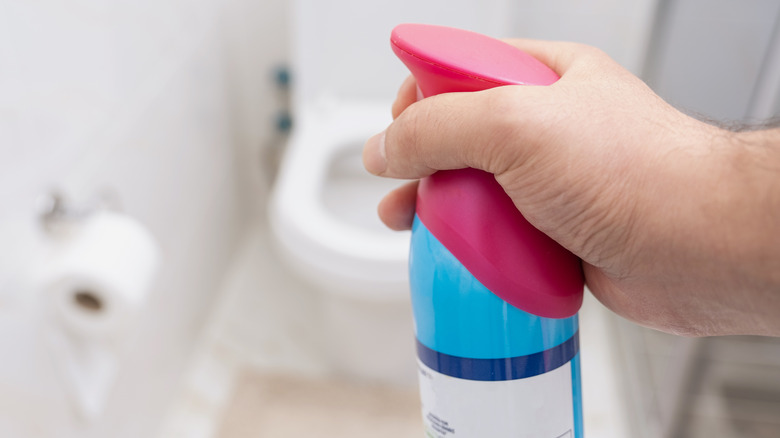Why Your Poop Smells Sweet
After a bowel movement, most of us don't leave the bathroom smelling like roses. This isn't our fault, however. Experts at Mount Sinai explain that healthy poops are supposed to smell unpleasant. They're also supposed to have a relatively familiar aroma to them. Therefore, if you've recently picked up on an unfamiliar scent when going No. 2, you might be wondering: What gives?
First, let's rule out what sweet-smelling poop is generally not related to. For instance, some people are concerned that sweet-scented poop is a potential indicator of diabetes. While it's true that the body will expel excess glucose through waste in people with diabetes, this is usually done in the form of sweet-smelling urine rather than stool (via Healthline).
Poop that smells sweet is also unrelated to maple syrup urine disease. Often tested for in infancy, this rare genetic disease is characterized by an inability to break down specific amino acids, the accumulation of which can be dangerous (via National Health Service). One of the main symptoms of the condition is sweet-smelling urine and sweat, but this does not include stool. Therefore, while sweet-smelling urine in babies can be a potential red flag, sweet-smelling bowel movements, on the other hand, are actually not uncommon in breastfed babies, according to the Australian Breastfeeding Association.
Sweet-smelling poop may be a sign of C. diff infection
Poop that smells sweet may alternatively be tied to a bacterial infection known as Clostridioides difficile infection (CDI), or C. diff for short (per Healthline). The infection usually develops in relation to antibiotic use. In addition to sweet-smelling poop, a person may also experience fever, cramps, nausea, diarrhea, and more. Older adults, as well as people having recently been admitted to the hospital, are among those who may be more susceptible to infection. The reason being is that the bacteria can be contracted through surface contact with bedrails, sinks, toilets, remote controls, cart handles, and more, reports the Mayo Clinic. While a greater number of cases tend to occur within healthcare environments, there are a reported 170,000 C. diff infections each year across the country that develop outside of medical facilities.
Some infected individuals may remain asymptomatic, but generally speaking, symptoms often begin to emerge around five to 10 days after beginning antibiotic usage. While the use of any antibiotic can make one vulnerable to infection, CDI is most strongly associated with penicillins, clindamycin, fluoroquinolones, and cephalosporins.
Diagnosis, treatment, and prevention of C. diff infection
Having a bowel movement with a sweet odor is not enough to diagnose CDI on its own. That's why it's important to seek medical treatment if you experience accompanying symptoms. While medical staff will not be able to identify a C. diff infection based on the smell of one's poop (via Healthline), they may take stool samples for further evaluation in order to determine a diagnosis, explains the Mayo Clinic. In more severe cases, your doctor may also perform a colonoscopy or order X-rays if they believe a patient may be experiencing complications.
If left untreated, a C. diff infection can lead to kidney failure, bowel perforation, or even death. Treatment for symptomatic individuals often involves the use of a different antibiotic to treat CDI. Surgical intervention may be needed in more severe cases of infection.
To reduce one's chances for CDI, good hygiene practices are important, such as routine hand-washing and the regular cleaning and sanitizing of healthcare facilities. Additionally, refrain from taking antibiotics unless absolutely needed. Finally, if your poop has developed a sweet scent, keep an eye out for any additional symptoms, and be sure to consult with your physician.



